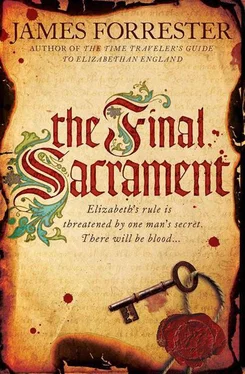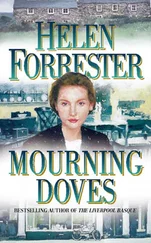James Forrester - Final Sacrament
Здесь есть возможность читать онлайн «James Forrester - Final Sacrament» весь текст электронной книги совершенно бесплатно (целиком полную версию без сокращений). В некоторых случаях можно слушать аудио, скачать через торрент в формате fb2 и присутствует краткое содержание. Жанр: Исторический детектив, на английском языке. Описание произведения, (предисловие) а так же отзывы посетителей доступны на портале библиотеки ЛибКат.
- Название:Final Sacrament
- Автор:
- Жанр:
- Год:неизвестен
- ISBN:нет данных
- Рейтинг книги:5 / 5. Голосов: 1
-
Избранное:Добавить в избранное
- Отзывы:
-
Ваша оценка:
- 100
- 1
- 2
- 3
- 4
- 5
Final Sacrament: краткое содержание, описание и аннотация
Предлагаем к чтению аннотацию, описание, краткое содержание или предисловие (зависит от того, что написал сам автор книги «Final Sacrament»). Если вы не нашли необходимую информацию о книге — напишите в комментариях, мы постараемся отыскать её.
Final Sacrament — читать онлайн бесплатно полную книгу (весь текст) целиком
Ниже представлен текст книги, разбитый по страницам. Система сохранения места последней прочитанной страницы, позволяет с удобством читать онлайн бесплатно книгу «Final Sacrament», без необходимости каждый раз заново искать на чём Вы остановились. Поставьте закладку, и сможете в любой момент перейти на страницу, на которой закончили чтение.
Интервал:
Закладка:
Rebecca got out of bed, felt for her shoes, and pulled them onto her feet. She put her dress on over her smock. Hunched forward to avoid the low beams, and with her hands stretched out in the darkness, she made her way to the opening and down the ladder to the room below. The faintest glow of the embers on the hearth could be seen, and finding a loose stick, she raked off the surface and crouched down to blow on them. Soon there was a small flame. She broke a few more sticks, built the fire a little more, and then fetched a candle.
If the two young men had come from Clarenceux, she thought, perhaps this was good news? But he would be unlikely to send two men, and certainly not two young men to her. He knew how harshly young men with strength and authority treated an attractive woman with neither husband nor father to protect her. Clarenceux was more considerate than that.
She put the candle into a lantern, set it beside the basin, and rinsed her face and hands. Taking the lantern, she went back upstairs to rub herself clean with linen and to dress in her best clothes, ready for church.
6
Clarenceux led his daughters by the hand through the churchyard to join the queue of people entering St. Bride’s. The great bell was ringing in the chill air above them. Occasionally he caught someone’s eye and nodded a brief greeting. Annie was feeling the cold and about to complain, so he held her hand a little tighter to remind her to be quiet. She would warm up soon enough in the church, with the heat of all the people.
He looked up at the vicar’s room above the porch. So many vicars had come and gone, so many changes had taken place. One had even gone to the stake. Now there was no vicar: William Living had resigned the previous year to go to St. Mary Abchurch, and a series of chaplains held the services. The present one was a nervous man with short black hair called Mr. Bowring. His sermons were too enthusiastic for Clarenceux, too idealistic, copied from Mr. Bowring’s more able heroes.
Clarenceux had first come here at the age of seventeen, before old King Henry’s dissolution, when the rector and right of patronage had been with the abbot of Westminster. It had then been one of the most beautiful religious buildings in the environs of the city, and he had marveled at it. The columns in the nave had carved stone vines twisting around them-a monument to a rich man called Vyner-and they had been painted, as if growing up to the roof. The walls too had been painted and the windows filled with rich glass. There had been six altars in the church, including a fine tall altar to St. Katherine in front of the rood screen. The printer Wynkyn de Worde was buried just in front of it. And each of those altars had had a painted screen behind it with sculptures of the highest quality, and an altar cloth around its front, and beautiful silver-gilt furniture. Above the high altar had been a great wood-and-silver cross. The whole nave had been a wonderful cave of color, light, and music. Chantry priests had sung through the day, until compline in the early evening; the organ had played during services. Now almost all of that had gone. The altars had been torn out, their sculptures smashed. The paintings had been covered in whitewash, the rood cross had been burned, the chantry priests all thrown out and the chantry hall sold off. The organ had been abandoned and was no longer used. No one dared sing anything but psalms these days. Tombs had been defaced, altar cloths turned into kitchen rags, and treasure melted down. Even the beautiful vine carvings on the columns had been purposefully damaged, the paint scraped away.
He entered the church and sat on the plain bench pews in the nave. Around him, people found their places, and sat or knelt. He looked up: traces of sculpted beauty remained but most had gone. His daughters would never know the lyrical majesty of their parish church, which, like the vine, had once drawn the eye in many directions. They would only know the one altar, the stern dictatorial commandment to look east. To them, church attendance would not be a matter of community but duty-to take their place obediently behind the profusion of private pews of various types that now filled the nave, and to listen to the didactic and sanctimonious speechifying of an impostor priest. It was a sign of the times: people were no longer members of a community but individuals, cut off from each other, as if they were all choosing to stand alone in the eyes of God. It made him bitterly sad to reflect on so much destruction. It was not holy. Destroying beautiful things and fragmenting society could not be justified, and the smashing of the sculptures had been particularly vindictive.
He knelt down, shut his eyes, and prayed for the mystical true faith to find another way to enter their lives, to allow a better understanding of God’s guidance. He prayed for the safety and security of his wife Awdrey and their daughters. He prayed for his closest friends, especially Julius Fawcett of Summerhill, Sir Richard Wenman of Caswell, John Hooker of Exeter, and especially for Rebecca Machyn. He prayed also for his servants, Thomas, Joan, and Nick, and the community of which he felt a part. Then he opened his eyes, and resumed his seat.
A strange gentleman, seated not far away, was looking at him. He had a distinct air of being out of place. He showed no sign of connection to those sitting beside him. His hair color was extraordinary-it was white, even though he was clearly not old. His clothes were just as distracting as his hair: despite the cold, he was not wearing a doublet but only an extremely fine linen shirt embroidered with gold and silk. He seemed not to know how to wear that properly either; the ties at the collar were hanging down and he wore no ruff. His cuffs too were loose. On his lower body he was wearing soft leather breeches and silk netherhosen.
Clarenceux met the strange gentleman’s gaze twice. The first time he held his eye. The second, he felt uneasy. He glanced at Awdrey, who turned to him. When she understood his expression of concern, and had herself seen the white-haired young man, she shrugged, to say she knew nothing about him. But from the corner of her eye she studied him, watching his movements.
At the end of the service, Clarenceux and Awdrey led their daughters straight out of the church. The white-haired man was caught in conversation with another gentleman who had been sitting on the benches in the nave, and who wanted to know more about him. He did not catch Clarenceux’s eye again.
7
Rebecca caught up with Mr. Wheatsheafen after the service in the church in the precincts of Portchester Castle. He was walking back to his lodging slowly, appreciating the sunny morning.
“Good morrow, Mr. Wheatsheafen. A fine day for December, is it not?”
He turned around and caught sight of her long brown hair and smiling eyes. “Ah, good morrow, Rebecca. It most certainly is a good day. I was just reflecting that, at my age, one appreciates every day that bit more, regardless of whether the weather be good or bad. One knows one has relatively few days left to enjoy. But if all days are good, then it follows that the fine ones are doubly pleasant.”
She walked alongside the physician, comfortable with him. He was a good Christian man who genuinely cared for people regardless of their status in the world.
“Did you see Philip Camp in the congregation?” she asked him. “To think-two weeks ago we did not expect him to live another day.”
“Indeed, it is something to give thanks for. The Lord is merciful as well as bountiful.”
Rebecca went on for a few more paces before turning the conversation to her prime concern. “You remember, yesterday, you told me that two young men had been looking for me?”
Читать дальшеИнтервал:
Закладка:
Похожие книги на «Final Sacrament»
Представляем Вашему вниманию похожие книги на «Final Sacrament» списком для выбора. Мы отобрали схожую по названию и смыслу литературу в надежде предоставить читателям больше вариантов отыскать новые, интересные, ещё непрочитанные произведения.
Обсуждение, отзывы о книге «Final Sacrament» и просто собственные мнения читателей. Оставьте ваши комментарии, напишите, что Вы думаете о произведении, его смысле или главных героях. Укажите что конкретно понравилось, а что нет, и почему Вы так считаете.












